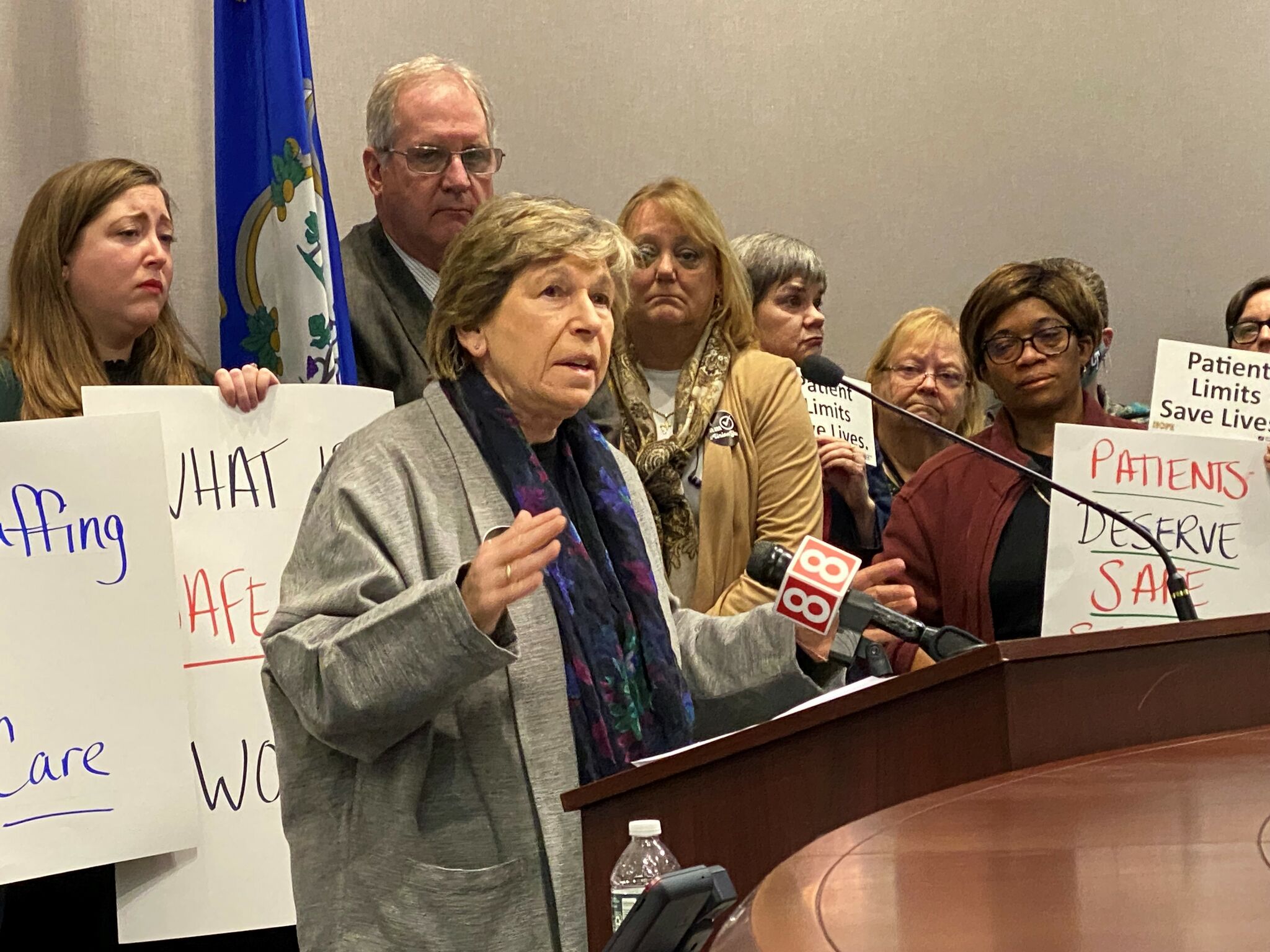[ad_1]
Randi Weingarten, president of the 1.7 million-member American Federation of Teachers, joined unionized hospital professionals and leading state lawmakers on Monday calling for more staff and better safety measures at a time when nurse burn-out and high patient ratios are threatening patients and staff alike.
During an hour-long news conference in the Legislative Office Building, Weingarten singled out Hartford are for high nurse-to-patient ratios that are threatening the ability of hospitals to foster successful patient outcomes.
“Hartford Health will not do the right thing,” Weingarten said. “We need to have moral legislation to force them to do the right thing. We need to take action locally, legislatively and within our communities to deal with safe staffing.” She said that while better pathways are needed to encourage people into the medical field, the current landscape, with mandatory overtime and nurse-to-patient ratios that prevent hourly visits during hospital shifts, are detrimental.
“Why would anybody go into this profession that saves lives when they hear what is happening every single day?” Weingarten said in a packed meeting room with nursing professionals carrying protest signs. “Because of the burn-out levels, this problem is actually getting worse and worse and worse.”
State Sen. Saud Anwar, D-South Windsor and state Rep. Cristine McCarthy Vehey, D-Fairfield, the co-chairs of the legislative Public Health Committee, said they are planning on legislation aimed at bringing more health care workers into the profession, while encouraging hospitals to address staffing problems that are resulting in veteran nurses quitting amid burn-out.
“We need to recognize that in order to achieve this, we are going to have to get the hospitals on board,” Anwar said. “Because in the health care workforce crisis, there is an immediate need, like yesterday we have to intervene and take care of the people right now. We support and encourage the current workers to stay in the field and recognize that you are not alone and we will fight for you.”
“I can tell you from personal experience that a good nurse is the difference between life and death,” said Anwar, a physician, who said that one pending bill in the legislature would develop a long-term strategy on nursing staffing levels, using an AFT report for reference. “The insurance companies over the last year, many of them, according to themselves to their stockholders, have doubled their profits. You know on whose backs? The workers’ backs. This is not a sustainable model. Yes, everybody should profit, but not to this pathological level.”
Sherri Dayton, a 48-year-old registered nurse who is vice president for health care for AFT Connecticut and works at Backus Hospital in Norwich, said that over the last five years, morale has reaches new lows, while mandatory overtime is exacerbating the staffing shortages to the point where care standards are in jeopardy. Patient falls and bed sores because nurses are unable to regularly visit and rearrange patients in their beds are becoming “crushing” defeats.
“I’m tired of seeing a profession that I love literally being destroyed and people quitting in droves because of it,” Dayton said, stressing that the shortage of nurses means that patients are frustrated and violence incidents are on the rise. “I hear are professionals saying, when they are giving a report to the next person, ‘well nobody died today.’ That’s the new goal we have to go with? The goal is to get them better; to heal.”
During a question and answer part of the news conference, union leaders confirmed that there are outstanding grievances.
A request for comment from Hartford HealthCare was not immediately returned. Jennifer Jackson, CEO of the Connecticut Hospital Association, agreed that working together is the key to enlarging and supporting nurses.
“Patients need a strong health care workforce, and hospitals and health systems are working with their employees and partners at the state, in education, and across health care to educate, train, and retain more nurses and other health care professionals in Connecticut,” Jackson said in a statement. “This includes a focus on safety, for both patients and the health care workforce who care for them.”
But Jackson warned that mandated nursing ratios “will stall the work” needed. “In fact, staffing ratios would exacerbate the problem, causing delays in care and raising costs with corporate nurse staffing agencies as the likely beneficiaries. Instead, let’s focus on solutions that support patients and the health care workforce, set aside policies like staffing ratios that would harm patient care, and work together on advancing legislative action to support recruitment, retention, and safety.”
U.S. Sen. Richard Blumenthal, who has protested with nurses on picket lines in Connecticut, said he plans to reintroduce legislation in Congress on staffing levels and combating workplace violence. While he voiced confidence that he could get enough Senate support to bring the bill to the floor, he is less sure of a bill’s success in the U.S. House of Representatives.
“At the end of the day it’s about the patients,” Blumenthal said.
kdixon@ctpost.com Twitter: @KenDixonCT
[ad_2]
Source link




